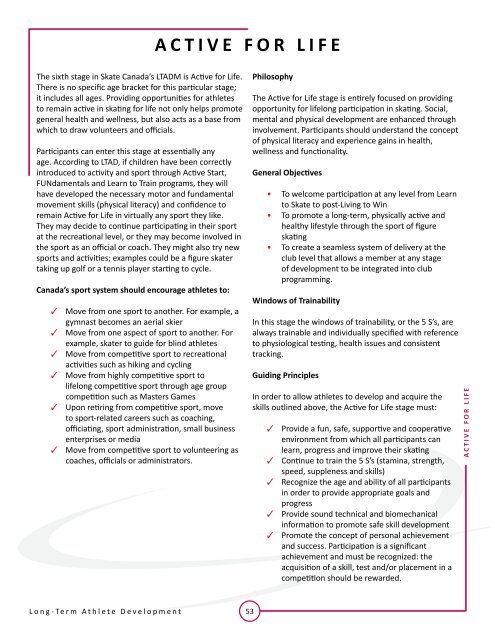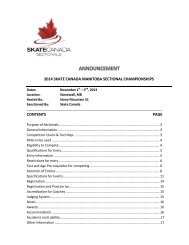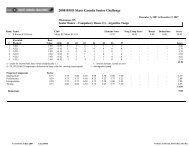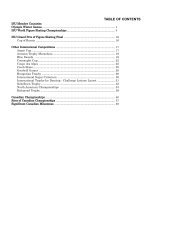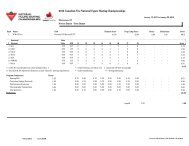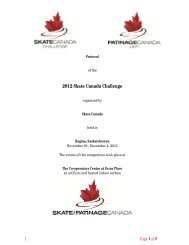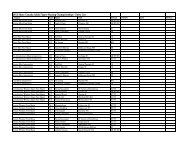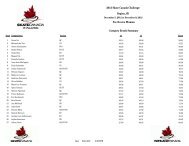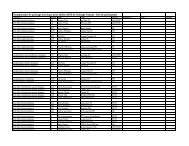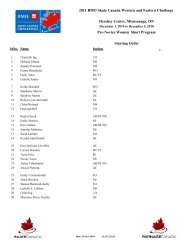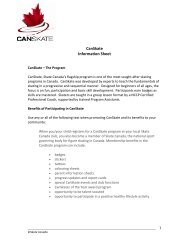LONG-TERM ATHLETE DEVELOPMENT - Skate Canada
LONG-TERM ATHLETE DEVELOPMENT - Skate Canada
LONG-TERM ATHLETE DEVELOPMENT - Skate Canada
You also want an ePaper? Increase the reach of your titles
YUMPU automatically turns print PDFs into web optimized ePapers that Google loves.
The sixth stage in <strong>Skate</strong> <strong>Canada</strong>’s LTADM is Active for Life.<br />
There is no specific age bracket for this particular stage;<br />
it includes all ages. Providing opportunities for athletes<br />
to remain active in skating for life not only helps promote<br />
general health and wellness, but also acts as a base from<br />
which to draw volunteers and officials.<br />
Participants can enter this stage at essentially any<br />
age. According to LTAD, if children have been correctly<br />
introduced to activity and sport through Active Start,<br />
FUNdamentals and Learn to Train programs, they will<br />
have developed the necessary motor and fundamental<br />
movement skills (physical literacy) and confidence to<br />
remain Active for Life in virtually any sport they like.<br />
They may decide to continue participating in their sport<br />
at the recreational level, or they may become involved in<br />
the sport as an official or coach. They might also try new<br />
sports and activities; examples could be a figure skater<br />
taking up golf or a tennis player starting to cycle.<br />
<strong>Canada</strong>’s sport system should encourage athletes to:<br />
3 Move from one sport to another. For example, a<br />
gymnast becomes an aerial skier<br />
3 Move from one aspect of sport to another. For<br />
example, skater to guide for blind athletes<br />
3 Move from competitive sport to recreational<br />
activities such as hiking and cycling<br />
3 Move from highly competitive sport to<br />
lifelong competitive sport through age group<br />
competition such as Masters Games<br />
3 Upon retiring from competitive sport, move<br />
to sport-related careers such as coaching,<br />
officiating, sport administration, small business<br />
enterprises or media<br />
3 Move from competitive sport to volunteering as<br />
coaches, officials or administrators.<br />
L o n g - Te r m A t h l e t e D e v e l o p m e n t<br />
A C T I V E F O R L I F E<br />
865 Sheord Road, Ottawa, Ontario K1J 1H9<br />
Phone 613.747.1007 I Toll Free 1.888.747.2372 I Fax 613.748.5718 I Toll Free Fax 1.877.211.2372<br />
53<br />
Philosophy<br />
The Active for Life stage is entirely focused on providing<br />
opportunity for lifelong participation in skating. Social,<br />
mental and physical development are enhanced through<br />
involvement. Participants should understand the concept<br />
of physical literacy and experience gains in health,<br />
wellness and functionality.<br />
General Objectives<br />
• To welcome participation at any level from Learn<br />
to <strong>Skate</strong> to post-Living to Win<br />
• To promote a long-term, physically active and<br />
healthy lifestyle through the sport of figure<br />
skating<br />
• To create a seamless system of delivery at the<br />
club level that allows a member at any stage<br />
of development to be integrated into club<br />
programming.<br />
Windows of Trainability<br />
In this stage the windows of trainability, or the 5 S’s, are<br />
always trainable and individually specified with reference<br />
to physiological testing, health issues and consistent<br />
tracking.<br />
Guiding Principles<br />
In order to allow athletes to develop and acquire the<br />
skills outlined above, the Active for Life stage must:<br />
3 Provide a fun, safe, supportive and cooperative<br />
environment from which all participants can<br />
learn, progress and improve their skating<br />
3 Continue to train the 5 S’s (stamina, strength,<br />
speed, suppleness and skills)<br />
3 Recognize the age and ability of all participants<br />
in order to provide appropriate goals and<br />
progress<br />
3 Provide sound technical and biomechanical<br />
information to promote safe skill development<br />
3 Promote the concept of personal achievement<br />
and success. Participation is a significant<br />
achievement and must be recognized: the<br />
acquisition of a skill, test and/or placement in a<br />
competition should be rewarded.<br />
A C T I V E F O R L I F E


